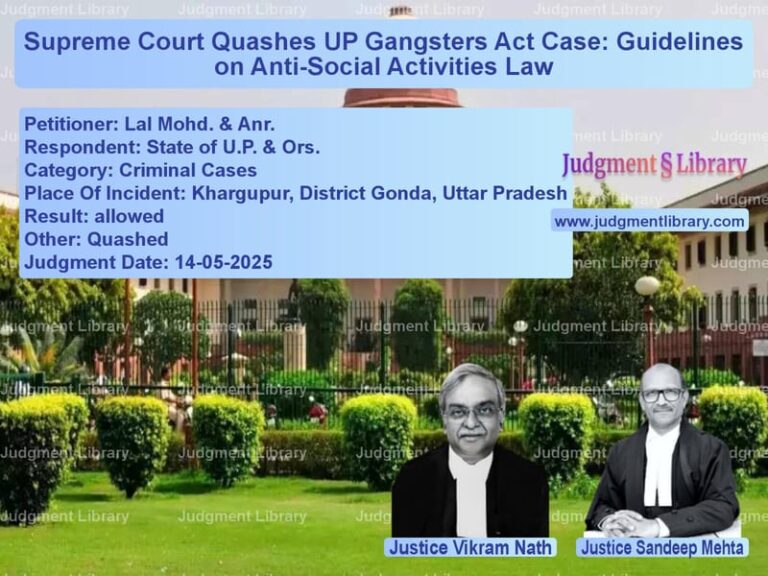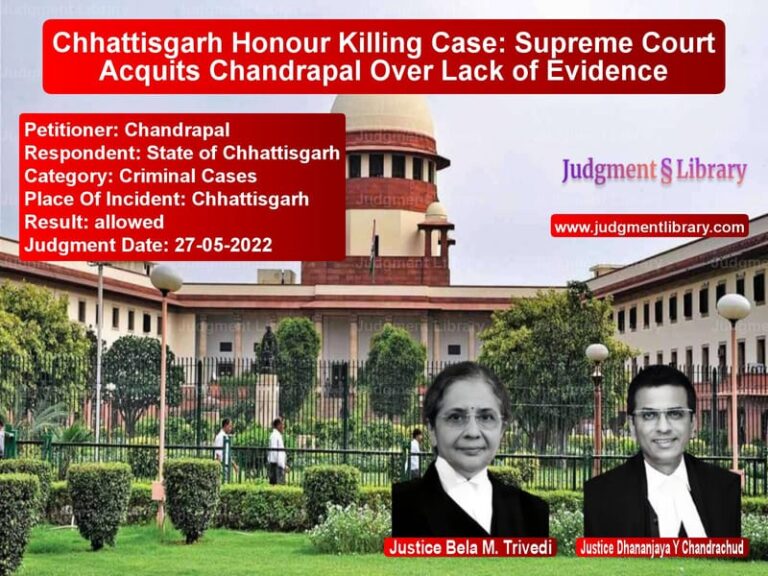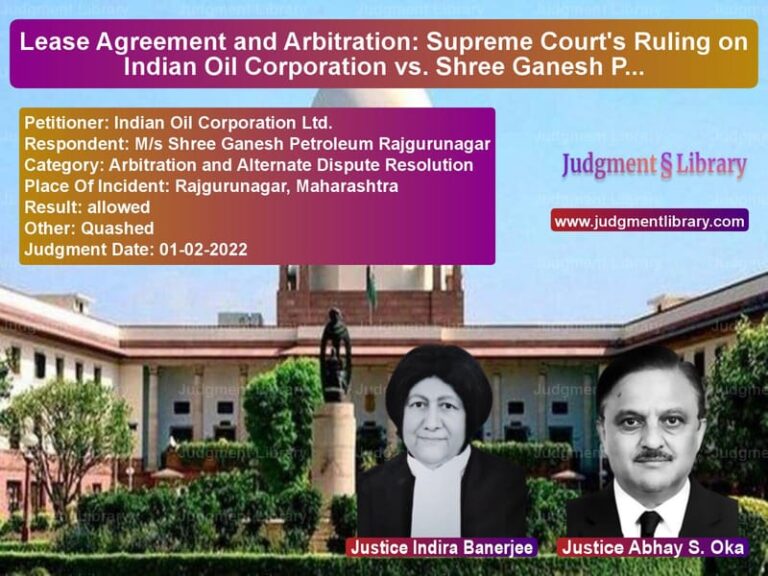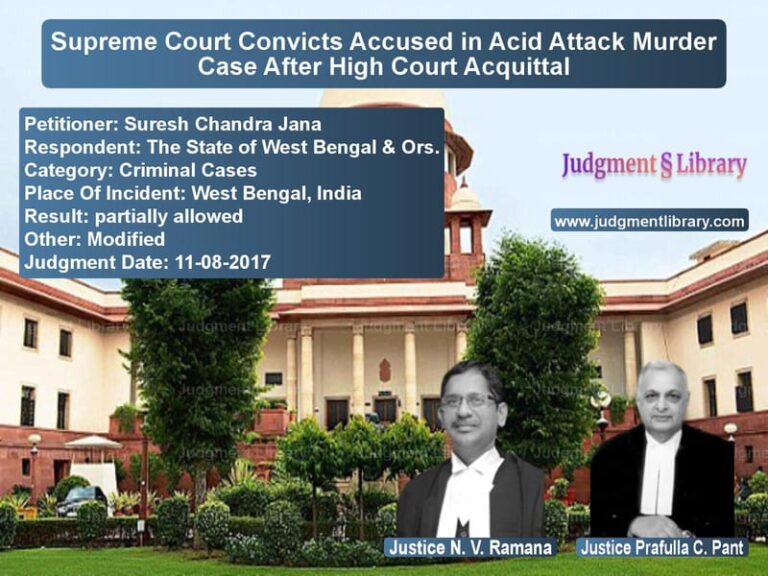Supreme Court Upholds CMD’s Tenure Extension Amid Allegations
The case of Educational Consultants (I) Ltd. SC/ST Employees Welfare Association v. Union of India & Others revolved around the legality of an extension granted to the Chairman-cum-Managing Director (CMD) of Educational Consultants India Limited (EdCIL). The judgment, delivered on August 2, 2016, by Chief Justice T.S. Thakur and Justices R. Banumathi and Uday Umesh Lalit, upheld the extension while rejecting allegations of favoritism and irregularities.
The appeal challenged a Delhi High Court ruling that had dismissed concerns over the extension of Ms. Anju Banerjee’s tenure as CMD of EdCIL. The petitioners alleged procedural lapses and a failure to secure proper vigilance clearance from the Central Vigilance Commission (CVC).
Background of the Case
EdCIL, a public sector undertaking under the Ministry of Human Resource Development (HRD), was established to provide consultancy and technical services in education and human resource development. Ms. Anju Banerjee was appointed as CMD on November 30, 2005, for a five-year term, which was set to expire on November 29, 2010.
As her tenure neared completion, the Ministry of HRD proposed an extension, referring the matter to the Public Enterprises Selection Board (PESB) and seeking vigilance clearance from the CVC. The PESB reviewed the matter and recommended a five-year extension. However, the CVC flagged complaints against Ms. Banerjee, raising concerns over irregularities and alleged pressure exerted on the organization’s Chief Vigilance Officer (CVO).
Petitioner’s Arguments
The Educational Consultants (I) Ltd. SC/ST Employees Welfare Association challenged the extension, arguing that:
- The CVC had raised serious concerns about Ms. Banerjee, including allegations of harassment and irregularities in appointments and promotions.
- Vigilance clearance was improperly granted despite unresolved complaints.
- The government ignored due process and granted an extension without fully addressing the concerns raised by the CVC.
Respondent’s Arguments
The Union of India, the Ministry of HRD, and Ms. Banerjee defended the extension, asserting that:
- The allegations were examined by a two-member senior officer committee, which found no merit in them.
- The CVC’s letter dated December 2, 2010, did not directly deny clearance but only advised the competent authority to consider the available inputs.
- The Ministry of HRD conducted its internal inquiry and found no reason to withhold the extension.
- The vigilance clearance process had been followed, and the final decision was within the government’s discretion.
Supreme Court’s Observations and Ruling
The Supreme Court upheld the Delhi High Court’s ruling, stating that the decision-making process was legally sound. Key observations included:
1. The CVC Did Not Expressly Deny Clearance
The Court noted:
“The Commission advised that the facts may be placed before the competent authority while it considers Ms. Banerjee’s case for extension of tenure.”
The Court ruled that this was not a denial of clearance but a recommendation for careful consideration.
2. The Allegations Were Duly Examined
The Court acknowledged that a senior officer committee reviewed the complaints against Ms. Banerjee and concluded:
“No merit was found in the allegations, and there was no case for denial of re-appointment.”
3. Proper Administrative Procedures Were Followed
The Court emphasized:
“The record indicates that the matter was processed as per established norms, and the competent authority considered all relevant factors before approving the extension.”
4. No Violation of Vigilance Clearance Guidelines
The judgment referenced government policies on vigilance clearance and found that the extension was granted in accordance with these policies.
Final Verdict
The Supreme Court dismissed the appeal and upheld the Delhi High Court’s decision, affirming Ms. Banerjee’s five-year extension as CMD of EdCIL.
Key Takeaways
- The Supreme Court reaffirmed that vigilance concerns must be properly considered but do not automatically bar an extension if no adverse findings exist.
- Government bodies must ensure due process in appointments and extensions.
- Allegations alone do not suffice to challenge an administrative decision unless backed by evidence.
Impact of the Ruling
The ruling reinforced administrative discretion in tenure extensions while emphasizing the importance of procedural fairness. It set a precedent that vigilance clearance does not necessarily mean absolute approval or rejection but serves as an input for final decision-making.
In conclusion, the Supreme Court’s ruling in Educational Consultants (I) Ltd. SC/ST Employees Welfare Association v. Union of India upheld the validity of a government appointment process while balancing the need for accountability in public sector enterprises.
Don’t miss out on the full details! Download the complete judgment in PDF format below and gain valuable insights instantly!
Download Judgment: Educational Consulta vs Union of India & Oth Supreme Court of India Judgment Dated 02-08-2016-1741878420681.pdf
Direct Downlaod Judgment: Direct downlaod this Judgment
See all petitions in Employment Disputes
See all petitions in Judgment by T.S. Thakur
See all petitions in Judgment by R. Banumathi
See all petitions in Judgment by Uday Umesh Lalit
See all petitions in dismissed
See all petitions in supreme court of India judgments August 2016
See all petitions in 2016 judgments
See all posts in Service Matters Category
See all allowed petitions in Service Matters Category
See all Dismissed petitions in Service Matters Category
See all partially allowed petitions in Service Matters Category







